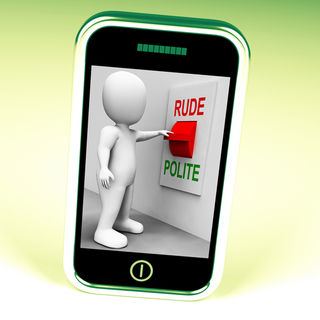Social Networking
Top 20 Social Networking Etiquette Tips for Teens
Teaching teens to mind their P's and Q's online.
Posted December 23, 2015 Reviewed by Jessica Schrader

It is the holiday season and many teens have listed an electronic device on their wish list. But before you wrap that gift, wrap your mind around this: Does your teen know how to mind his/her P's and Q's online?
With the ever-changing digital world, as parents, it's oftentimes difficult to keep up with new apps and which social media sites are most popular with teens. Unfortunately, that means a lot of teens are roaming free on the information highway with little supervision. As a result, some teens are forgetting to mind their P's and Q's when they are online. Before turning your teen loose on the internet you may want to give him/her a crash course in Social Networking Etiquette 101 for Teens.
Top 20 Social Networking Etiquette Tips for Teens:
1. Exercise the Golden Rule: Treat others the way you want to be treated. Speak with and treat someone online as you would speak with and treat him/her face-to-face.
2. Remember everything you post is public; it doesn't matter whether or not you delete the post: if you've published it, it's traceable. Plus, when you post things online, you're creating a digital footprint. A digital footprint is the trail of stuff you leave behind when you're online.
3. DON'T USE ALL CAPS when you're emailing or posting something. All CAPS is a form of internet shouting and it screams at you from a computer screen.
4. Use exclamation points sparingly! Exclamation points can take away from your message. Rather than using an exclamation point to express how you feel, try using the right words to get your point across.
5. OK, this is a new one—don’t use periods when texting. Texting is a form of conversation, so when you text it should sound as if it were coming out of your mouth. Periods can appear abrupt and rude in a text. So when you text, type your message as you would say it in a face-to-face conversation.
6. Speak kindly. Remember: it may look like a screen in front of you, but there is another person (or people) on the receiving end. Think about how you would feel if you received the message you’re sending? If the answer isn't a favorable one, then don't send it.
7. Don't post things when you’re angry. It's never a good idea to post something when you’re mad. Sure, it may feel good to type up a fiery response to something that ticked you off, but typing and sending are two different things. Plus, while it may feel good in the interim, you may feel guilty or regretful later. If you are too riled up and can't fight the temptation to tell someone off then there's an amazing button on every device that shuts it off. Use this button when you are mad and walk away.
8. Similar to No. 7, don’t post things when you are emotional. When you are in a heightened state of emotion, you may not be thinking clearly or able to form your thoughts and ideas. Don’t use the internet as a means for sorting through your feelings. Rather, meet up with a trusted adult or friend to help you work through your emotions.
9. Don’t journal your thoughts and feelings in a public forum. If you’re going to keep a journal, do it the old fashion way and write it down—pen and paper style (yes, those items still exist). By recording your thoughts and feelings on paper, you can actually destroy the pages for good.

10. Use different usernames and passwords for your sites. Don't use the same one all the time. Many people use the same username and password for all of their sites and this is not a good idea. If someone figures out your security information, they will have access to everything. It's best to set-up different usernames and passwords for maximum protection.
11. Don't make up silly email addresses. You will use your email address for college applications, job applications, resumes, and scholarship opportunities. Look at your email address and ask, "Does this email address set a good impression?" If not, scrap that email and start again.
12. Don't post a picture or video of someone else without his or her permission. Also don't snap pictures or a video someone without his or her permission. Just because there is a camera on your phone it doesn't give you the right to snap a shot of someone. Don't post a picture of people on-line without their consent. Even if you do have their consent, make sure that the picture isn't inappropriate (better yet, don't take inappropriate pictures).
13. Be very selective of what you post or share online. If you have a question about what you are posting, then that is your moral compass saying "Don't post it." You would be wise to heed the advice of your conscience.
14. Don't talk to strangers. Don't get into chat rooms and reveal confidential things about yourself. You may feel that you know the person on the other end of your connection, but he/she can be a phony.
15. Don't give out personal and confidential information online. Never share your full name, home address, phone number, Social Security number, passwords, school's name, names of family members, or credit card numbers.
16. Silence your phone in public places. Nothing is more annoying than a phone going off in a public place, especially if it has a funky ring tone.
17. Don't play on your device or constantly text when you are in the company of someone else. It just isn't nice and can cause the person to feel unimportant.
18. Don't talk in a public place where others can hear your conversation. Exercise the 10-foot proximity rule—keep a distance of 10 feet from the closest person when you're talking on the phone.
19. Watch your tone. Sometimes things can come across ruder and harsher online than face-to-face. One reason is because we rely on nonverbal communication to help us interpret conversations. Unless you are using a video chat app, most sites don't allow you to see a person's reaction to what you are saying. So certain words or punctuation marks can imply something different online than if they were said face-to-face.
20. Set time parameters of how long you're on your devices. Electronic devices will never take the place of a person. Too much of anything is unhealthy, so use devices in moderation and hang out with friends offline more than online.

And there you have the top 20 Social Networking Etiquette tips for teens (and adults, too). While advancing technology is exciting, it also has its drawbacks (and for teens, this comes in the form of social skills). So whether you're a teen who is constantly online or a tween who is getting his/her first electronic device—remember it's important to have meaningful interactions with others both online and offline. So, go ahead and wrap that gift, and while you're at it add the bonus feature of teaching your teen to mind his/her P's and Q's when the electronic device is in use. Happy Holidays!




